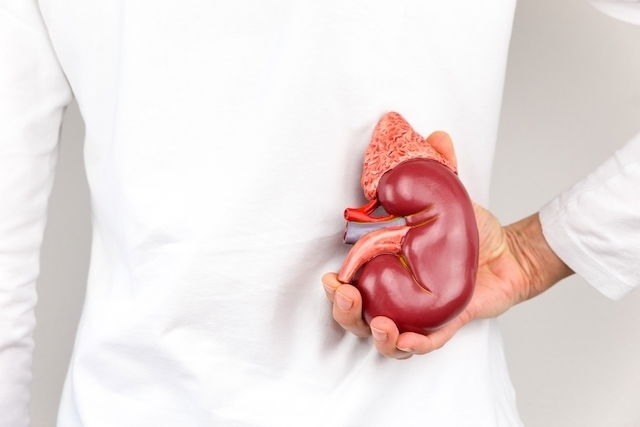What is it:
Nephritis is an inflammation of the glomeruli of the kidneys. These structures are responsible for filtering and eliminating toxins and other substances from the body.
Most cases of nephritis occur due to a serious infectious, medications use, poisoning, or autoimmune disease, but it can also happen as a complication of hepatitis or HIV. The most common symptoms include decreased urine output, swollen legs and blood in the urine.
If you suspect your may have nephritis, you should proceed to the hospital or consult a neurologist to confirm a diagnosis and start treatment promptly to avoid complications like anemia or kidney injury..

Main symptoms
The most common symptoms of nephritis are:
- Decreased urine output
- Blood in the urine
- Excess sweating, especially on the face, hands and feet
- Facial or leg swelling
- Increased blood pressure
Chronic nephritis has additional symptoms, such as loss of appetite, nausea, vomiting, fatigue, insomnia, itchiness and cramping.
Confirming a diagnosis
To confirm a diagnosis, it is important to consult a nephrologist. The doctor will order tests (like a urine test, ultrasound, CT scan and eventually a kidney biopsy) to identify the problem and start treatment as appropriate.
Types of nephritis
Nephritis can be categorized by the area of the kidney affected or the underlying cause of the problem:
- Glomerulonephritis: Inflammation mainly affects the first part of the filtration structure, the glomerulus. This can be acute or chronic.
- Interstitial nephritis: Inflammation occurs in the renal tubules and the space between the tubules and glomerulus.
- Lupus nephritis: The glomerulus is affected, and inflammation occurs due to lupus, which is an autoimmune disease
The type of nephritis can be identified by the doctor and will help to guide the type of treatment needed.
Possible causes
There are many reasons that can lead to the development of nephritis, such as:
- Excessive use of medications, like analgesics, antibiotics, non-steroidal anti-inflammatories, diuretics, anticonvulsants, calcineurin inhibitors like cyclosporin and tacrolimus
- Infections caused by bacteria, virus and other microorganisms
- Autoimmune diseases, like lupus, Sjrögen syndrome, and IgG4-related disease
- Prolonged exposure to toxins like lithium, lead, cadmium and aristolochic acid
In addition, people with other types of nephropathies related to cancer, diabetes, HIV and anemia falciforme are at a higher risk of nephritis.
Treatment options
Treatment depends on the type of nephritis present. Acute nephritis can be treated with total rest, blood pressure management and decreased salt intake. Nephritis caused by an infection can require additional treatment with an antibiotic.
With chronic nephritis, in addition to blood pressure management, treatment includes the use of anti-inflammatory medications (like corticosteroids), immunosuppressants and diuretics with a low salt, low protein and low potassium diet.
The nephrologist may request frequent follow-ups as chronic nephritis leads to chronic renal disease.
Prevention measures
To prevent the development of nephritis, you should avoid smoking, reduce stress and avoid medications that are not prescribed by your doctor. These factors can contribute to kidney injuries.
People with a history of other conditions, particularly autoimmune disease, should adhere to their prescribed treatment and follow-up with their doctors regularly for blood pressure checks and blood work. The doctor may recommend diet changes, like decreasing your overall intake of protein, salt and potassium.






























